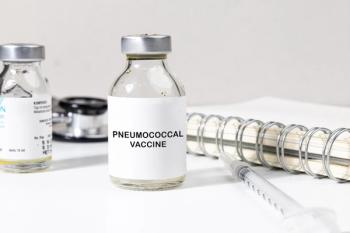
Shore Up the Immune System as Flu Season Approaches
As influenza season nears, strengthening the immune system with supplements and vaccines can help it withstand the annual onslaught of viruses. But there is no one-size-fits-all regimen – each individual must choose products specific to their health needs and situation, such as those described below.
Zinc: Immunity Booster
Malnourished children in Third World countries had a high mortality rate from infections – specifically, pneumonia and infectious diarrhea, which were the leading causes of death. When they were given zinc, which plays an integral role in immune function, their collective life expectancy went up.1 Share that information when recommending immunity boosters to patients and customers. Any person with a poor diet could have low levels of zinc and may benefit from a zinc supplement during the flu season. This includes people with anorexia, cachexia or alcoholism, as well as strict vegetarians and those who have limited food choices for any reason.
People with malabsorption issues related to gastritis, chronic diarrhea, or gastric bypass surgery also may have low zinc levels, and those with genetic conditions that affect the biometabolism of zinc can have unexpectedly low levels. Zinc deficiency affects 60% to 70% of adults with sickle cell disease.2 Older adults in nursing homes also benefit from zinc supplementation, possibly due to poor appetite or diet, malabsorption, and/or a slowing of biochemical reactions.3
Vitamin C: Infection Fighter
Marathon runners who took vitamin C, which also plays an integral role in the immune system, had fewer colds.4 Why single out marathoners? They are in constant motion and under physical stress, putting them at risk of dehydration and depleted electrolytes. Because vitamin C is water soluble and involved in so many reactions throughout the body, perhaps it is quickly used up and washed out. Anyone at risk of low vitamin C levels from malnutrition, malabsorption or physical stress might find it helpful to take extra vitamin C. Skiers and soldiers training in subarctic conditions also may benefit from vitamin C supplementation.5 Low levels of vitamins D and E may also be associated with frequent cold and flu infections.6,7
Probiotics: Illness Shortener
What about a well-nourished person who has an intact immune system—can their immune system be further strengthened? Emerging evidence suggests that probiotics can help a healthy immune system develop and mature. Specific probiotics given prior to vaccinations helped lead to higher antibody titers in response to the vaccination.8
Also, the results of many randomized, controlled trials in classroom settings with school-aged children and young adults showed that those who received specific probiotics did not get the flu as frequently as did their classmates who were administered a placebo. Those who got probiotics and went on to develop the flu had shorter and less severe illness. In findings from a 2015 Cochrane Review of 13 randomized, controlled trials involving 3,720 participants, including children, adults and older adults, probiotics (any specified strain or dose) outperformed placebo in reducing episodes of acute upper respiratory tract infections, shortening the mean duration of an episode, curtailing antibiotic use and reducing cold-related school absences.9
In a 2014 systematic review and meta-analysis, investigators found evidence from “good quality” randomized controlled trials that probiotics reduce the duration of common acute respiratory infections in otherwise healthy children and adults.10
To choose specific probiotics products that have been shown to reduce flu, check a database that catalogs all the products on the market. AEprobio, Natural Medicines and MedlinePlus show which products were tested for immune support and the level of evidence to support that product.
Elderberry: Virus Vanquisher
For short-term strengthening of the immune system, elderberry is an option. It increases the production of inflammatory cytokines, such as interleukins and tumor necrosis factor. Elderberry, which has been compared with Tamiflu, is thought to have both antiviral and immunomodulating effects. The extract inhibits replication of several strains of influenza viruses A and B. In vitro, elderberry fruit extract also inhibits H1N1 swine flu. Elderberry flavonoids are thought to bind to H1N1 virions and prevent the virus from entering host cells. Researchers also have found that people who have consumed elderberries have higher levels of antibodies against the influenza virus.11
Commercial products are readily available, and people who have access to the fresh fruit can find online recipes for elderberry jams and syrups. The plant is generally safe for most people. Its medicinal properties are in the ripe fruit; the seeds and other parts can cause nausea and vomiting.
Echinacea : Possible Prophylactic
Like elderberry, echinacea possesses antiviral properties and immunomodulating effects. Certain products can increase the production of inflammatory cytokines, such as interleukins and tumor necrosis factor.12 A wide variety of echinacea species, plant parts, preparations and dosages are used, which leads to differing results; therefore, choosing an effective
product is important.
A 2014 Cochrane Review of 24 double-blinded, randomized, controlled trials involving 4,631 participants concluded that the results of individual prophylaxis trials consistently show positive (though not significant) trends, but the potential effects are of questionable clinical relevance.13 A 2013 review concluded that prophylactic use of echinacea preparations is ineffective for preventing the common cold.14
American Ginseng : Long-Term Commitment
Ginseng has not been shown to reduce the number of colds that people catch, although it may shorten the length of illness, concluded the authors of 2011 evaluation.15 Taking American ginseng to prevent colds means taking it for a prolonged period. American ginseng may interact with anticoagulants.
Garlic: Stinky Solution
A 2014 evaluation of the research on garlic concluded that there isn’t enough evidence to show whether this herb helps prevent colds or relieves symptoms.16 What garlic does do: cause bad breath and body odor and interact with anticoagulant drugs.
Melatonin: Sleep Inducer
Sleep also affects health and should not be neglected. Lack of sleep can increase susceptibility to the common cold.17 Even more alarming: Rats that were sleep deprived died of sepsis.18 It appears that sleep and adequate nutrition are essential to a healthy immune system. People who travel and are at risk of not getting adequate sleep may benefit from taking melatonin.
Vaccines: Antibody Developers
Feeding the immune system low doses of bacterial/viral information prior to exposure can help it develop antibodies to fight pathogens. That is why people who live on farms and with pets are thought to have healthy immune systems – they get low doses of bacterial and viral information. That’s also why vaccines work so well.
We are fighting an invisible war against pathogens, and the first thing we should do is to fortify our immune system with adequate nutrition, sleep and vaccines. The next step is to avoid these germs with frequent hand-washing, wearing masks, staying home when sick and limiting exposure to pathogens. Best of luck to everyone this coming flu season.
References
1. Bhutta ZA1, Black RE, Brown KH et al, Prevention of diarrhea and pneumonia by zinc supplementation. J Pediatr. 1999 Dec;135(6):689-97.
2. Prasad AS. Zinc deficiency in patients with sickle cell disease. Am J Clin Nutr 2002;75:181-2.
3. Meydani SN1, Barnett JB, et al, Serum zinc and pneumonia in nursing home elderly. Am J Clin Nutr. 2007 Oct;86(4):1167-73.
4. Gorton HC, Jarvis K. The effectiveness of vitamin C in preventing and relieving the symptoms of virus-induced respiratory infections. Journal of Manipulative and Physiological Therapeutics. 1999;22(8):530–533.
5. Hemilä H, Chalker E. Vitamin C for preventing and treating the common cold. Cochrane Database of Systematic Reviews. 2013;(1):CD000980.
6. Lee GY, Han SN. The Role of Vitamin E in Immunity. Nutrients. 2018;10(11):1614. Published 2018 Nov 1. doi:10.3390/nu10111614
7. Low Vitamin D Levels Associated with Colds and Flu
8. Namba K1, Hatano M, Yaeshima T, Takase M, Suzuki K.Effects of Bifidobacterium longum BB536 administration on influenza infection, influenza vaccine antibody titer, and cell-mediated immunity in the elderly. Biosci Biotechnol Biochem. 2010;74(5):939-45. Epub 2010 May 7.
9. Hao Q, Dong BR, Wu T, et al. Probiotics for preventing acute upper respiratory tract infections. Cochrane Database of Systematic Reviews. 2015;(2):CD006895.
10. King S, Glanville J, Sanders ME, Fitzgerald A, Varley D. Effectiveness of probiotics on the duration of illness in healthy children and adults who develop common acute respiratory infectious conditions: a systematic review and meta-analysis. Br J Nutr. 2014;112(1):41–54. doi:10.1017/S0007114514000075
11. Vlachojannis JE, Cameron M, Chrubasik S. A systematic review on the Sambuci fructus effect and efficacy profiles. Phytotherapy Research. 2010;24(1):1–8.
12. Pleschka S, Stein M, Schoop R, et al. Anti-viral properties and mode of action of standardized Echinacea purpurea extract against highly pathogenic avian influenza virus (H5N1, H7N7) and swine-origin H1N1 (S-OIV). Virology Journal. 2009;6:197.
13. Karsch-Völk M, Barrett B, Kiefer D, et al. Echinacea for preventing and treating the common cold. Cochrane Database of Systematic Reviews. 2014;(2):CD000530.
14. 2013 echinacea review A 2013 review of echinacea. =Livingston C1, Cozzens J2, Hamilton A1., FPIN's clinical inquiries. Treatments for symptoms of the common cold.Am Fam Physician. 2013 Dec 15;88(12):Online.
15. Seida JK, Durec T, Kuhle S. North American (Panax quinquefolius) and Asian ginseng (Panax ginseng) preparations for prevention of the common cold in healthy adults.
16. Lissiman E, Bhasale AL, Cohen M. Garlic for the common cold. Cochrane Database of Systematic Reviews. 2014;(11):CD006206.
17. Cohen S, Doyle WJ, Alper CM, Janicki-Deverts D, Turner RB. Sleep habits and susceptibility to the common cold. Arch Intern Med. 2009;169(1):62–67. doi:10.1001/archinternmed.2008.505
18. Rechtschaffen A, Bergmann BM. Sleep deprivation in the rat: an update of the 1989 paper. Sleep. 2002 Feb;25(1):18-24.
Newsletter
Pharmacy practice is always changing. Stay ahead of the curve with the Drug Topics newsletter and get the latest drug information, industry trends, and patient care tips.























